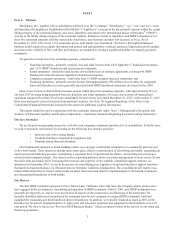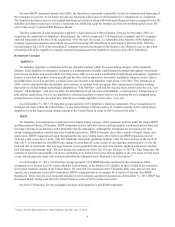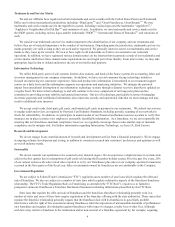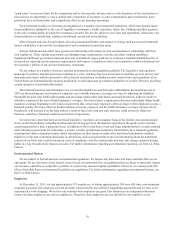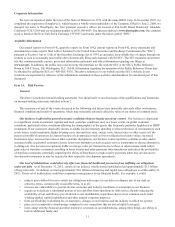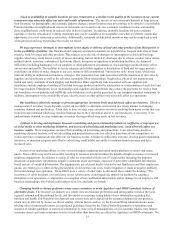IHOP 2015 Annual Report Download - page 29
Download and view the complete annual report
Please find page 29 of the 2015 IHOP annual report below. You can navigate through the pages in the report by either clicking on the pages listed below, or by using the keyword search tool below to find specific information within the annual report.9
Trademarks and Service Marks
We and our affiliates have registered certain trademarks and service marks with the United States Patent and Trademark
Office and various international jurisdictions, including “DineEquity®” and “Great Franchisees. Great Brands.®” We own
trademarks and service marks used in the Applebee's system, including various logos and the trademarks “Applebee's®,”
“Applebee's Neighborhood Grill & Bar®” and variations of each. In addition, we own trademarks and service marks used in
the IHOP system, including various logos and the trademarks “IHOP®,” “International House of Pancakes®” and variations of
each.
We consider our trademarks and service marks important to the identification of our company and our restaurants and
believe they are of material importance to the conduct of our business. Depending upon the jurisdiction, trademarks and service
marks generally are valid as long as they are used and/or registered. We generally intend to renew our trademarks and service
marks as they come up for renewal. We own or have rights to all trademarks we believe are material to our restaurant
operations. In addition, we have registered various domain names on the Internet that incorporate certain of our trademarks and
service marks, and believe these domain name registrations are an integral part of our identity. From time to time, we may take
appropriate legal action to defend and protect the use of our intellectual property.
Information Technology
We utilize third-party point of sale systems, kitchen data systems, and back-of-the house systems for accounting, labor and
inventory management in our company restaurants. In addition, we have several consumer-facing technology initiatives
focused on improving our customers' experience. Sales and product mix information is transmitted to our restaurant support
centers on a daily basis and this information supports our operations and marketing initiatives. We mitigate the potential
impact from operational interruption of our information technology systems through a disaster recovery plan that is updated on
a regular basis. We believe that technology is and will continue to be a key component of our long-term plans and are
committed to providing system stability and targeted innovation. Our use of technology, particularly in terms of managing
electronic payments and confidential information, also represents security and operational risks that we must manage and may
result in additional costs incurred.
We accept credit cards, third party gift cards, and branded gift cards as payment in our restaurants. We submit our systems
to regular audit and review, as required by Payment Card Industry Standards, including periodic scanning of our networks to
check for vulnerability. In addition, we participate in annual audits of our financial and human resources systems to verify that
measures are in place to protect our employees' personally identifiable information. As a franchisor, we are not responsible for
ensuring that our franchisees maintain compliance; however, we regularly encourage them to take similar steps to maintain
compliance and to mitigate risk. For further information regarding Information Technology, see Item 1A, Risk Factors.
Research and Development
We do not engage in any material amount of research and development activity from a financial perspective. We do engage
in ongoing culinary development and testing, in addition to consumer research into customers’ preferences and opinions as well
as overall industry trends.
Seasonality
We do not consider our operations to be seasonal to any material degree. We do experience a slight increase in system-wide
sales in the first quarter due to redemptions of gift cards sold during the December holiday season. Over the past five years, 26%
of our annual system-wide sales (retail sales reported to us by our franchisees plus sales at our company-operated restaurants)
occurred in the first quarter of the fiscal year. Sales at restaurants owned by franchisees are not attributable to the Company.
Government Regulation
We are subject to Federal Trade Commission (“FTC”) regulation and a number of state laws which regulate the offer and
sale of franchises. We also are subject to a number of state laws which regulate substantive aspects of the franchisor-franchisee
relationship. The FTC's Trade Regulation Rule on Franchising, as amended (the “FTC Rule”), requires us to furnish to
prospective domestic franchisees a Franchise Disclosure Document containing information prescribed by the FTC Rule.
State laws that regulate the offer and sale of franchises and the franchisor-franchisee relationship presently exist in a
number of states and some of these laws require registration of the franchise offering with the state authorities. Those states that
regulate the franchise relationship generally require that the franchisor deal with its franchisees in good faith, prohibit
interference with the right of free association among franchisees, limit the imposition of unreasonable standards of performance
on a franchisee and regulate discrimination against franchisees with respect to charges, royalty fees or other fees. Although
such laws may restrict a franchisor in the termination and/or non-renewal of a franchise agreement by, for example, requiring






